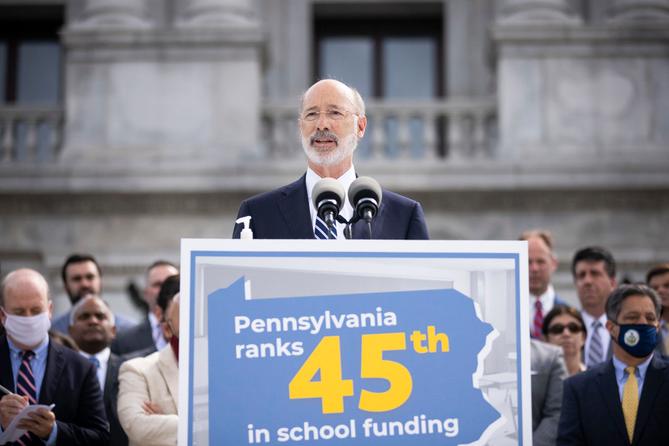Spotlight PA is an independent, nonpartisan newsroom powered by The Philadelphia Inquirer in partnership with PennLive/The Patriot-News, TribLIVE/Pittsburgh Tribune-Review, and WITF Public Media. Sign up for our free newsletters.
HARRISBURG — Flanked by Democrats in the House and Senate, Gov. Tom Wolf took to the steps of the Capitol this week to push for more than $1 billion in new funding for public schools, money that would be funneled through a formula meant to ensure that underserved school districts receive adequate funding.
Wolf, a Democrat, said he believed the decades-old state education funding formula is inadequate and has historically shortchanged schools in both urban and rural districts hanging on by a financial thread.
“Making sure that we make the investments with a particular eye, continuing to have a very significant laser focus on the investments we make in education that are fair, that are equitable, and do not do any harm to districts across Pennsylvania — that’s gotta be our goal and that’s what we’re gonna work towards,” Senate Minority Leader Jay Costa (D., Allegheny) said.
The Democrats’ plea comes as Wolf and the GOP-controlled legislature enter the final weeks of negotiations on enacting a state budget by the June 30 deadline.
This year, the two sides have an advantage: Instead of facing financial shortfalls, the state has $3 billion in extra cash on hand from better-than-expected tax collections. That is on top of more than $7 billion in federal dollars Pennsylvania is receiving in coronavirus relief aid.
Although both Democrats and Republicans have said they are committed to providing every student with a fair and equitable education, they disagree on the best way to achieve that goal.
Wolf signed the fair funding formula into law in 2016 to equitably distribute state education dollars to Pennsylvania’s 500 school districts. But it only applies to new investments in education — last year, 11% of state funding, or $700 million, went through the formula.
The rest of the state dollars are distributed through a “hold harmless” approach, which ensures public school districts never lose funding. But some Democrats and Republicans oppose this policy as it fails to recognize rapidly changing student population numbers, as well as its tendency to neglect urban area schools.
“What you see is a collaboration of lawmakers from rural districts and urban districts and suburban districts who know that the ZIP code that you live in should not determine your child’s livelihood, nor their opportunities for success,” said House Minority Leader Joanna McClinton (D., Philadelphia).
Wolf wants the legislature to distribute all state education funding through the formula, while also providing $1.15 billion to ensure no school districts lose money. In February, when he initially released his budget proposal, Wolf recommended raising the state’s personal income tax rate to cover the change.
But now, as the state’s fortunes have shifted, Democrats say lawmakers should tap into the $3 billion surplus to accommodate the change with no need to raise any taxes.
Republican lawmakers, however, appear unlikely to support the plan, raising concerns about the state’s actual financial situation.
“Due to excess deficit spending from the Wolf administration and budget projections dramatically handicapped by an economy languishing under the governor’s shutdown over the past year, Pennsylvania’s budget situation is not as rosy as Democrats would make it out to be,” Jason Gottesman, a spokesperson for House Majority Leader Kerry Benninghoff (R., Centre), said. “While Republicans have and will continue to ensure our commitment to funding education, we are not in a position to use what financial flexibility we do have to make promises beyond our ability to fulfill them.”
The decision on how to address the gap in education funding may eventually be taken out of lawmakers’ hands entirely.
A lawsuit brought by school districts, advocates, and students that claims Pennsylvania is violating its constitutional duty to “provide a thorough and efficient system of public education” is set to be heard in Commonwealth Court later this year. If successful, the lawmakers could be compelled to make significant changes to the process of distributing state dollars.
An analysis prepared by the petitioners found Pennsylvania’s public school children are being shortchanged by $4.6 billion, with school districts that serve Black and Latino students disproportionately affected. In Norristown Area School District — where 76% of students are Black and Latino — the analysis revealed that there is a shortfall of $4,645 per student.
“We struggle each year to develop a budget that provides for our students while remaining fiscally responsible to our taxpayers,” Chris Dormer, superintendent of Norristown Area School District, said at the state education funding press conference.
WHILE YOU’RE HERE… If you learned something from this story, pay it forward and become a member of Spotlight PA so someone else can in the future at spotlightpa.org/donate. Spotlight PA is funded by foundations and readers like you who are committed to accountability journalism that gets results.
